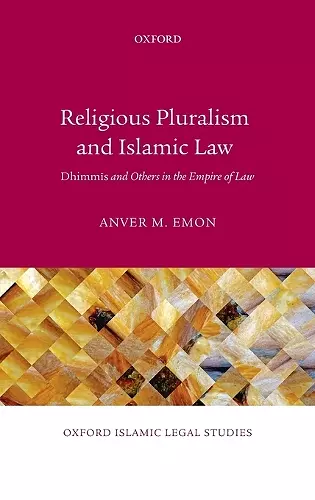Religious Pluralism and Islamic Law
Dhimmis and Others in the Empire of Law
Format:Hardback
Publisher:Oxford University Press
Published:26th Jul '12
Currently unavailable, and unfortunately no date known when it will be back
This hardback is available in another edition too:
- Paperback£47.49(9780198722021)

The question of tolerance and Islam is not a new one. Polemicists are certain that Islam is not a tolerant religion. As evidence they point to the rules governing the treatment of non-Muslim permanent residents in Muslim lands, namely the dhimmi rules that are at the center of this study. These rules, when read in isolation, are certainly discriminatory in nature. They legitimate discriminatory treatment on grounds of what could be said to be religious faith and religious difference. The dhimmi rules are often invoked as proof-positive of the inherent intolerance of the Islamic faith (and thereby of any believing Muslim) toward the non-Muslim. This book addresses the problem of the concept of 'tolerance' for understanding the significance of the dhimmi rules that governed and regulated non-Muslim permanent residents in Islamic lands. In doing so, it suggests that the Islamic legal treatment of non-Muslims is symptomatic of the more general challenge of governing a diverse polity. Far from being constitutive of an Islamic ethos, the dhimmi rules raise important thematic questions about Rule of Law, governance, and how the pursuit of pluralism through the institutions of law and governance is a messy business. As argued throughout this book, an inescapable, and all-too-often painful, bottom line in the pursuit of pluralism is that it requires impositions and limitations on freedoms that are considered central and fundamental to an individual's well-being, but which must be limited for some people in some circumstances for reasons extending well beyond the claims of a given individual. A comparison to recent cases from the United States, United Kingdom, and the European Court of Human Rights reveals that however different and distant premodern Islamic and modern democratic societies may be in terms of time, space, and values, legal systems face similar challenges when governing a populace in which minority and majority groups diverge on the meaning and implication of values deemed fundamental to a particular polity.
Polytheists and the irreligious were anathematized in classical Islam, but it assigned People of the Book, mainly Christians and Jews, to an intermediate protected category, the dhimma. Much writing on this institution takes sides, arguing that it was a mechanism either for interreligious harmony or for persecution of minorities. Anver Emon, in his weighty and original Religious Pluralism and Islamic Law, rejects both opposing views, as well as the concept of tolerance as a useful analytical tool. * Jonathan Benthall, Times Literary Supplemen *
ISBN: 9780199661633
Dimensions: 241mm x 163mm x 29mm
Weight: 734g
382 pages